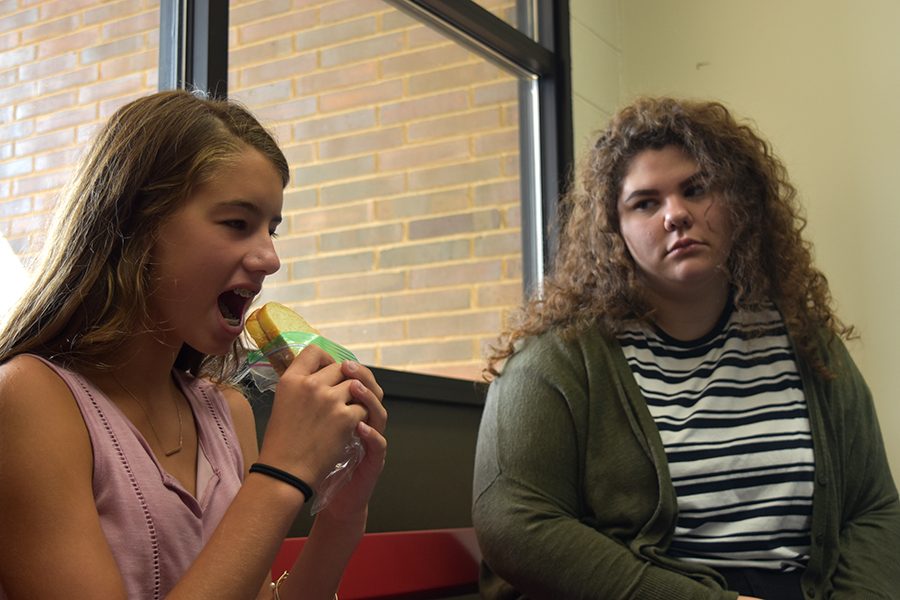From Halloween parties in elementary schools to the post-test food potlucks at high schools, food has become a staple in schools. Outside of lunch, students have brought snacks to school and enjoyed “food parties” in class. However, Parkway’s new Food Safety Protocol may soon change that.
“Due to [the threat of allergies], there is a change in Parkway protocol requiring that schools celebrate birthdays and other events and accomplishments without food,” Parkway elementary school Green Trails stated in an email to parents. “Food that is brought to school to be distributed will be returned home. As a staff, we support this change based on what we have learned about life threatening food allergies.”
 Green Trails is not the only school with a revised food policy; Parkway’s Food Safety Protocol is a comprehensive mandate and West High is no exception. In a schoolwide Pathfinder survey, upwards of 95 percent of students do not support the new policy.
Green Trails is not the only school with a revised food policy; Parkway’s Food Safety Protocol is a comprehensive mandate and West High is no exception. In a schoolwide Pathfinder survey, upwards of 95 percent of students do not support the new policy.
“A lot of people like bringing in food for food parties. It also brings unity to classrooms. Some people even say that eating helps them focus better on the task at hand,” an anonymous participant in the Pathfinder survey said. “Parkway should consider the dampen on moral that this will have on kids throughout classrooms in Parkway. We need our food parties, our food sales and our popcorn and bagels.”
Due to the new policy, bagels and popcorn sales will no longer be able to fund the class of 2018’s graduation party, creating a deficit.
“If enforced as it is written, the Food Safety Protocol’s elimination of bagel and popcorn sales, and prevention of new food fundraisers before, during and after school, will significantly impact the fundraisings’ efforts of the senior class for their graduation party,” West Parent Organization (WPO) president Jeff Todd said.
Todd also advocates that high schools should be exempt from parts of the updated code.
“The WPO is certainly concerned for the welfare and safety of children in our school. We believe that while some of the aspects of Parkway’s Food Safety Protocol make sense for elementary schools, much of them do not make sense for high schools,” Todd said.
 Todd believes the Food Safety Protocol is not preparing students for going out into the real world, where there are no adults telling people with allergies what foods they can and cannot eat.
Todd believes the Food Safety Protocol is not preparing students for going out into the real world, where there are no adults telling people with allergies what foods they can and cannot eat.
“High school kids are at the age where we permit them to operate licensed motorized vehicles on school property, where we are actively preparing them for their next steps in life as adults, usually on their own and typically away from home. We need to recognize that they have reached a point that they are able to advocate for themselves, and empower them to do so,” Todd said.
Seventy-seven percent of students agree.
“High schoolers should be responsible enough to know their food allergies and know what they can and can’t eat. They will need to know and get used to asking what ingredients are in something when they get beyond high school,” another anonymous survey participant said.
However, during senior Duncan McBride’s freshman year, she was rushed to the hospital because she accidentally consumed crackers with nuts in them.
 “I got an epipen injection [in the nurse’s office at school]. Once an epipen is used in school, you have to have an emergency evacuation in an ambulance. I went to the ER for about eight hours with a relapse since it stays in your system and you get hives everywhere,” McBride said. “It’s kind of a scary experience, so I think kids that have experienced that are a lot more cautious.”
“I got an epipen injection [in the nurse’s office at school]. Once an epipen is used in school, you have to have an emergency evacuation in an ambulance. I went to the ER for about eight hours with a relapse since it stays in your system and you get hives everywhere,” McBride said. “It’s kind of a scary experience, so I think kids that have experienced that are a lot more cautious.”
McBride believes food parties should be kept, but teachers and students should be aware of students with allergies in their classes.
“I think the bagel and popcorn sales are a good thing because people look forward to bagels, so they want to keep them,” she said. “I just think that they just shouldn’t get bagels with nuts or bagels from Bread Co where all of the bagels were touching each other because there’s a lot of cross-contamination there.”
Overall, McBride agrees the majority of the changes are the best way to promote health and safety for all students.
“I know a lot of people are upset about the food changes, but it’s not the end of the world,” she said. “They are acting like they are going to starve to death if they go a few hours without eating.”




![Smiling in a sea of Longhorns, Fox 2 reporter Ty Hawkins joins junior Darren Young during the morning Oct. 3 pep rally. The last time West was featured in this segment was 2011. “[I hope people see this and think] if you come to [Parkway] West, you will have the time of your life because there are so many fun activities to do that make it feel like you belong here. I was surprised so many people attended, but it was a lot of fun,” Young said.](https://pwestpathfinder.com/wp-content/uploads/2025/10/Edited2-1200x798.jpg)
![West High seniors and families listen as a representative of The Scholarship Foundation of St. Louis, Teresa Steinkamp, leads a Free Application for Federal Student Aid (FAFSA) workshop. This session, held in the library, provided guidance on financial aid, scholarships and student loan options. “This event is very beneficial for any seniors who are applying to or considering applying to colleges after high school [because] the cost of college is on the rise for seniors and parents,” college and career counselor Chris Lorenz said.](https://pwestpathfinder.com/wp-content/uploads/2025/09/DSC_4478-1200x778.jpg)
![Senior Kamori Berry walks across the field during halftime at the Homecoming football game on Sept. 12. During the pep assembly earlier that day, she was pronounced Homecoming Queen. “I thought it was nice that the crowd [started] cheering right away. I know [my friends] were really excited for me, and my family was happy because typically non-white people don't win,” Berry said.](https://pwestpathfinder.com/wp-content/uploads/2025/09/DSC7046-Enhanced-NR-1200x798.jpg)



![Pitching the ball on Apr. 14, senior Henry Wild and his team play against Belleville East. Wild was named scholar athlete of the year by St. Louis Post-Dispatch after maintaining a high cumulative GPA and staying involved with athletics for all of high school. “It’s an amazing honor. I feel very blessed to have the opportunity to represent my school [and] what [it] stands for,” Wild said.](https://pwestpathfinder.com/wp-content/uploads/2025/05/unnamed-6-1200x714.jpg)
![The Glory of Missouri award recipients stand with their certificates after finding out which virtue they were chosen to represent. When discovering their virtues, some recipients were met with contented confirmation, while others, complete surprise. “I was not at all surprised to get Truth. I discussed that with some of the other people who were getting the awards as well, and that came up as something I might get. Being in journalism, [Fellowship of Christian Athletes and] Speech and Debate, there's a culture of really caring about truth as a principle that I've tried to contribute to as well. I was very glad; [Truth] was a great one to get,” senior Will Gonsior said.](https://pwestpathfinder.com/wp-content/uploads/2025/04/Group-Glory-of-Missouri.jpg)

![Focused on providing exceptional service, sophomore Darsh Mahapatra carefully cleans the door of a customer’s car. Mahapatra has always believed his customers deserve nothing less than the best. “[If] they’re trusting us with their car and our service, then I am convinced that they deserve our 100 percent effort and beyond,” Mahapatra said.](https://pwestpathfinder.com/wp-content/uploads/2025/10/DSC_0018-1200x800.jpg)
![Sophomore Aleix Pi de Cabanyes Navarro (left) finishes up a soccer game while junior Ava Muench (right) warms up for cross country practice. The two came to Parkway West High School as exchange students for the 2025-2026 school year. “The goal for the [exchange] program is to provide opportunities for both Parkway students and our international exchange students to learn about other cultures, build connections and become confident, capable, curious and caring — Parkway’s Four C’s — in the process,” Exchange Program Lead Lauren Farrelly said.](https://pwestpathfinder.com/wp-content/uploads/2025/10/Feature-Photo-1200x800.png)
![Leaning on the podium, superintendent Melissa Schneider speaks to Parkway journalism students during a press conference. Schneider joined Parkway in July after working in the Thompson School District in Colorado. “My plan [to bond with students] is to get things on my calendar as much as possible. For example, being in [classes] is very special to me. I am trying to be opportunistic [meeting] kids [and] being in [the school] buildings. I have all the sports schedules and the fine arts schedules on my calendar, so that when I'm available, I can get to them,” Schneider said.](https://pwestpathfinder.com/wp-content/uploads/2025/09/IMG_5425-1200x943.jpeg)
![Gazing across the stage, sophomore Alexis Monteleone performs in the school theater. The Monteleone family’s band “Monte and the Machine” has been releasing music since 2012, but Alexis started her own solo career in 2024 with the release of her first single, Crying Skies. “My whole family is very musical, [and I especially] love writing [songs with them],” Monteleone said.](https://pwestpathfinder.com/wp-content/uploads/2025/09/DSC7463-1200x798.jpg)
![Leaping through the air, senior Tyler Watts celebrates his first goal of the season, which put the Longhorns up 1-0 against the Lafayette Lancers. Watts decided to play soccer for West for his last year of high school and secured a spot on the varsity roster. “[Playing soccer for West] is something I had always dreamed of, but hadn’t really had a good opportunity to do until now. It’s [really] fun being out [on the field], and I’m glad I decided to join the team. It’s just all about having fun with the boys and enjoying what time we have left together,” Watts said.](https://pwestpathfinder.com/wp-content/uploads/2025/09/DSC_1951-1200x855.jpg)

![Junior Fiona Dye lifts weights in Strength and Conditioning. Now that the Trump administration has instituted policies such as AI deregulation, tariffs and university funding freezes, women may have to work twice as hard to get half as far. "[Trump] wants America to be more divided; he wants to inspire hatred in people,” feminist club member and junior Clara Lazarini said.](https://pwestpathfinder.com/wp-content/uploads/2025/05/Flag.png)
![As the Trump administration cracks down on immigration, it scapegoats many immigrants for the United States’ plights, precipitating a possible genocide. Sophomore Annabella Whiteley moved from the United Kingdom when she was eight. “It’s pretty scary because I’m on a visa. When my visa expires next year, I’m not sure what’s going to happen, especially with [immigration] policies up in the air, so it is a concern for my family,” Whiteley said.](https://pwestpathfinder.com/wp-content/uploads/2025/05/DSC_0077-7copy.jpg)
![Shifting global trade, President Donald Trump’s tariffs are raising concerns about economic stability for the U.S. and other countries alike. “[The tariffs are] going to pose a distinct challenge to the U.S. economy and a challenge to the global economy on the whole because it's going to greatly upset who trades with who and where resources and products are going to come from,” social studies teacher Melvin Trotier said.](https://pwestpathfinder.com/wp-content/uploads/2025/05/MDB_3456-1200x800.jpg)
![Red, white and blue, the American flag holds the values of our democracy. The fight that we once endured has returned, as student journalists and senior correspondents across the country are losing their voices due to government control. “[Are] the White House and [the] government limiting free speech [and] freedom of the press? Yes [they are],” chief communications officer of the Parkway School District and former journalist Elisa Tomich said.](https://pwestpathfinder.com/wp-content/uploads/2025/03/Untitled-design-14.jpg)
